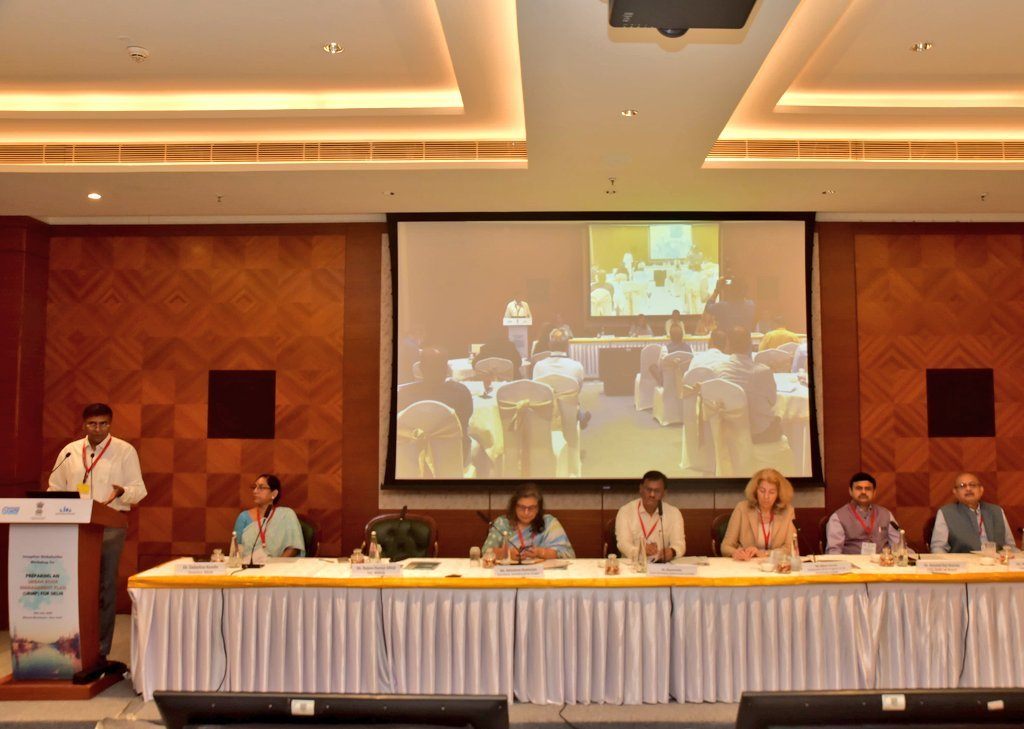Delhi Launches Urban River Plan to Reclaim and Revive the Yamuna River
The workshop brought together a wide spectrum of stakeholders—urban planners, scientists, international partners, policy makers, and citizen representatives—in a powerful show of collective resolve.

- Country:
- India
In a landmark move to restore the ecological and cultural lifeline of Delhi, the National Mission for Clean Ganga (NMCG), under the Ministry of Jal Shakti, in collaboration with the National Institute of Urban Affairs (NIUA) and the Government of NCT of Delhi, convened a high-level Inception Stakeholder Workshop on 15th July 2025 at Bharat Mandapam, New Delhi. The event formally initiated the development of the Urban River Management Plan (URMP) for the Yamuna River—Delhi’s most vital but neglected water body.
The workshop brought together a wide spectrum of stakeholders—urban planners, scientists, international partners, policy makers, and citizen representatives—in a powerful show of collective resolve. The aim: to chart a sustainable, scientific, and people-centric roadmap for rejuvenating the Yamuna River, aligning with the city's broader vision for climate resilience and environmental justice.
Leadership Commitment to a River-Centric Urban Future
The event was presided over by Sh. Dharmendra, Chief Secretary of Delhi, with Ms. Debashree Mukherjee, Secretary, Department of Water Resources (DoWR), as Guest of Honour. In his keynote address, Sh. Dharmendra issued a call to action with a potent message:
“Yamuna improves, Delhi improves.” He urged for actionable outcomes and a shared ownership of the Yamuna’s health, emphasizing that the URMP must be practical, results-driven, and aligned with citizens’ aspirations for a livable, healthy, and vibrant capital.
Ms. Debashree Mukherjee, in her remarks, stressed that water management is now central to the urban experience, particularly in the context of climate change. She underscored the importance of community involvement, calling the URMP not just a policy document, but a civic movement to revive the Yamuna and reimagine Delhi as a river-sensitive city.
Integrated, Multi-Stakeholder Collaboration Begins
A notable highlight of the workshop was the participation of representatives from 14 key departments and agencies, forming a newly constituted Multi-Stakeholder Group under the Department of Urban Development, NCT of Delhi. These include the Delhi Jal Board (DJB), Delhi Pollution Control Committee (DPCC), urban planning bodies, academic institutions, and civic agencies—tasked with delivering a unified vision for river rejuvenation.
Sh. Rajeev Kumar Mital, Director General of NMCG, opened the workshop with a strong emphasis on scientific planning and risk-based assessment. He stated that the URMP will embed “river-sensitive thinking” into Delhi’s urban planning, aiming for not just pollution control but ecological, social, and hydrological revitalization.
International and Academic Partnerships Amplify the Vision
Ms. Marisa Gerards, Ambassador of the Kingdom of the Netherlands to India, reaffirmed the growing India–Netherlands partnership on urban water resilience. She announced the establishment of a Centre of Excellence on Urban Water Resilience, a joint initiative of NMCG, IIT Delhi, and the Dutch Government, which will provide strategic and technical support for the URMP.
Ms. Gerards highlighted the Dutch concept of “Water as Leverage”, advocating its inclusion in the URMP to foster innovation, equity, and practical solutions. She also praised India's River Cities Alliance (RCA) as a vibrant model of public engagement and institutional cooperation.
From the World Bank, Ms. Rebecca Epworth cited global case studies, especially from Australia, cautioning against fragmented planning models and applauding the URMP’s emphasis on shared accountability and institutional alignment. The World Bank reiterated its support in shaping the framework and implementation of the plan.
Experts from IIT Delhi elaborated on the importance of data-driven planning, particularly for urban flooding, pollution mapping, and hydrological modeling. Their role will be critical in designing the flood resilience and disaster management components of the URMP.
Eminent ecologist Prof. C.R. Babu emphasized the role of Nature-Based Solutions and the restoration of biodiversity-rich river ecosystems, advocating for urban wetlands, native vegetation, and ecological buffers as part of the Yamuna’s recovery.
Structure and Scope of the Urban River Management Plan
The URMP, jointly developed by NIUA and IIT Delhi, will tackle Yamuna’s degradation through an integrated, cross-sectoral, and data-backed framework, addressing:
-
Sewage and drain management
-
Wetland and floodplain restoration
-
Water reuse and recycling
-
Encroachment removal and buffer zone creation
-
Pollution source identification and control
-
Riverfront redevelopment with citizen access
A special monitoring system—the Urban River Management Index (URMI)—will track progress across ten key domains, including water quality, biodiversity, infrastructure resilience, community engagement, and institutional coordination.
The plan will culminate in a series of Detailed Project Reports (DPRs) to be funded through a mix of Central and State Government allocations, Viability Gap Funding (VGF), and contributions from Urban Local Bodies (ULBs) and private stakeholders.
A Cultural Awakening Through Civic Participation
More than a bureaucratic exercise, the URMP is envisioned as a civic movement. The workshop featured interactive sessions, quizzes, and awareness activities, showcasing how Delhi’s citizens—from schoolchildren to professionals—can contribute to the Yamuna’s restoration.
It was repeatedly stressed that the success of the URMP will rest on collective responsibility, not just among governments, but also citizens, media, academic institutions, and the private sector.
A River’s Revival: Delhi’s Resolve
As the workshop concluded, the message resonated clearly: Delhi is reclaiming its river—not just as a body of water, but as the soul of the city. The Yamuna’s restoration is no longer an abstract dream but a defining mission for the capital in the face of climate change, urbanization, and ecological degradation.
Through scientific planning, global cooperation, and empowered community engagement, Delhi is embarking on a bold and hopeful journey—to restore the Yamuna, redefine its urban fabric, and become a model for river-centric urban resilience across India and beyond.
ALSO READ
With sustainable development under threat, Sevilla summit rekindles hope and unity
IDB and EIB Forge New Deal to Boost Sustainable Development in LAC
Global South often received nothing more than token gestures on climate finance, sustainable development, & tech access: PM Modi at BRICS.
How agritourism is emerging as public health strategy in sustainable development
Green Light for Gateway's New Jetty: A Step Towards Sustainable Development










